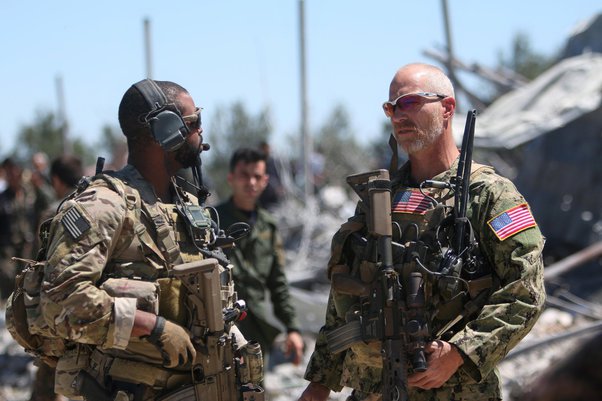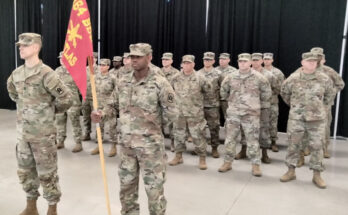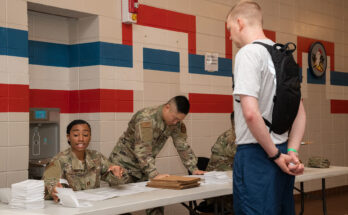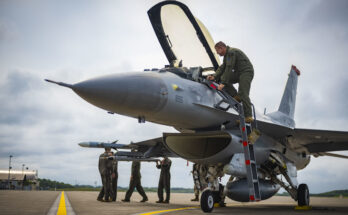United States Delta Force Recruitment: The United States Delta Force, officially known as 1st Special Forces Operational Detachment-Delta (1st SFOD-D), is one of the most secretive and elite special operations forces globally.
Known for their versatility and exceptional skill set, they are the tip of the spear in the United States defense apparatus.
With a reputation built on rigorous training programs and the ability to adapt to any situation, Delta Force operatives are a class apart.
History and Legacy of Delta Force
Delta Force, formally known as 1st Special Forces Operational Detachment-Delta (1st SFOD-D), is one of the United States military’s most secretive and elite units. Its history and legacy are rooted in expertise, precision, and some of the most challenging missions in modern warfare.
A. Formation and Evolution of Delta Force
The formation of Delta Force dates back to the late 1970s, specifically 1977, when it was established by Colonel Charles Beckwith. Inspired by his experiences with the British Army’s Special Air Service (SAS), Beckwith saw the necessity for a similar type of unit in the United States. Delta Force was designed to be a highly adaptable and flexible unit capable of conducting a variety of special operations, including hostage rescue, counter-terrorism, and reconnaissance.
Over the years, Delta Force has evolved in response to the changing face of global conflict. The unit has continuously refined its tactics, techniques, and procedures, ensuring it remains at the forefront of special operations forces. Delta Force operators are selected through a rigorous selection process and are known for their exceptional skill sets, which they continue to hone through constant training.
B. Key Missions and Achievements Shaping Its Legacy
The legacy of Delta Force has been shaped by its involvement in key missions throughout its history. One of the most notable was Operation Eagle Claw in 1980, the attempted rescue of American hostages in Iran, which, despite its failure, highlighted the need for a robust counter-terrorism capability and led to significant changes in the military’s special operations structure.
Subsequent successful operations, such as the 1989 capture of Panamanian dictator Manuel Noriega (Operation Just Cause) and the pivotal role in the Battle of Mogadishu in 1993, showcased the effectiveness of Delta Force in complex situations. Post 9/11, Delta Force has been instrumental in the Global War on Terrorism, taking part in high-profile raids, such as the one that led to the death of ISIS leader Abu Bakr al-Baghdadi in 2019.
C. Role in Modern Military Operations
Today, Delta Force remains a critical component of the United States’ military capabilities, with a role that extends into various aspects of modern warfare. Its operators are often involved in direct action missions, special reconnaissance, and counter-terrorism operations around the globe. The unit works closely with other special operations forces and is regularly called upon to undertake missions that require the highest levels of skill and secrecy.
The unit’s ability to operate in diverse environments, from urban centers to remote locations, positions it as a key player in addressing asymmetric threats. As security challenges evolve, Delta Force continues to adapt, developing new strategies and technologies to counter emerging threats, ensuring its lasting impact on the United States’ national security and its legacy as one of the most elite combat units in the world.
Incorporating this unit’s storied history into contemporary military narratives not only pays homage to its past but also enlightens the public on the integral role Delta Force plays in safeguarding freedoms and executing missions critical to global stability.
Understanding United States Delta Force Recruitment
The Delta Force, formally known as 1st Special Forces Operational Detachment-Delta (1st SFOD-D), is one of the United States’ most secretive and elite military units. Aspiring to join this exclusive team requires surpassing stringent selection criteria, enduring grueling selection phases, and possessing exceptional physical and mental attributes. Let’s delve into what it takes to be considered for Delta Force.
Basic Criteria and Qualifications for Candidates
Prospective Delta Force operators must meet basic criteria to even be considered. Typically, candidates should:
- Be male and a member of the military, as the unit is not currently open to civilian applicants.
- Hold a rank of E-4 (Corporal/Specialist) or above.
- Have at least 2.5 years of service left on their enlistment contract at the time of application.
- Possess a General Technical score of 110 or higher on the Armed Services Vocational Aptitude Battery (ASVAB).
- Have a record of military stability and physical durability.
Meeting these qualifications is just the first step. The selection process itself is where the true challenge begins.
The Distinct Phases of the Delta Force Selection Process
The Delta Force selection process is notoriously rigorous, broken down into distinct phases:
- Screening: A thorough evaluation of the candidate’s service record and a battery of psychological tests.
- Assessment and Selection (A&S): A demanding course designed to assess a candidate’s endurance, mental fortitude, and leadership abilities.
- Operator Training Course (OTC): For those who pass A&S, OTC provides specialized combat training to hone the skills necessary for Delta operations.
Each phase is a filter, designed to identify and retain only the most capable individuals.
Physical and Mental Attributes Sought in Recruits
Delta Force recruits are expected to exhibit outstanding physical and mental attributes, including:
- Physical Endurance: The ability to withstand grueling physical tasks for extended periods.
- Mental Toughness: Resilience in the face of extreme stress and the capability to make sound decisions under pressure.
- Adaptability: Flexibility in unpredictable scenarios and diverse environments.
- Team Orientation: Strong interpersonal skills to work effectively in a tight-knit team.
- Intellectual Capacity: Sharp problem-solving skills and quick thinking are imperative.
The path to becoming a Delta Force operator is paved with challenges designed to attract only the finest soldiers. For those exceptional few who embody these traits, the opportunity to serve in one of the most respected Special Operations units awaits.
Understanding the depth of commitment and the caliber of skill required for Delta Force selection provides a glimpse into the making of the United States’ most elite warriors.
Application Process for United States Delta Force Recruitment
The Delta Force, officially known as 1st Special Forces Operational Detachment-Delta (1st SFOD-D), is one of the U.S. military’s elite covert units, specializing in counterterrorism and other high-stakes operations. Aspiring to join this prestigious group means understanding the nuanced recruitment process. Below we outline the essential steps, requirements, and what you can expect when applying to become a Delta Force operative.
A. How and Where to Apply for Delta Force
Applying for Delta Force isn’t as straightforward as submitting an application online or walking into a recruitment office. Delta Force typically recruits from within the military, primarily from the Army (although exceptional candidates from other branches may be considered). Service members with an exemplary record and at least 2.5 years of service may receive an invitation to apply or may volunteer for consideration during a Delta briefing held for Special Forces and Rangers.
To volunteer, service members must submit a packet through their chain of command, which usually includes service records, a statement of service, and recommendations. This packet should highlight the candidate’s physical fitness, marksmanship, leadership qualities, and mission accomplishment ethos.
B. Understanding the Timeline for the Recruitment Process
The recruitment process is rigorous and can take several months to complete. It begins with the application packet, followed by an extensive screening process. The first phase includes physical fitness tests, psychological evaluations, and a series of interviews. Those who pass this phase are invited to the grueling Operator Training Course (OTC), which lasts approximately six months.
It’s crucial for applicants to prepare for delays and to remain patient throughout this period. The timeline can be affected by various factors, including the applicant’s current deployment, training schedules, and the needs of the Delta Force.
C. Necessary Documentation and Preliminary Requirements
Before applying, candidates must gather necessary documentation which typically includes:
- Proof of U.S. citizenship
- A General Technical score of at least 110 on the Armed Services Vocational Aptitude Battery (ASVAB)
- Qualifying scores on physical fitness tests
- Service records and evaluations
- Letters of recommendation
- A secret or top-secret security clearance
In addition to the documentation, preliminary requirements often include a demonstration of advanced military skills, leadership capabilities, and a clean disciplinary record. Physical fitness is paramount; thus, maintaining peak physical condition is essential even before beginning the application process.
Understanding these aspects of Delta Force recruitment is vital for those seeking to join the ranks of America’s elite soldiers. Preparation, perseverance, and professionalism are the keys to navigating this challenging path. Those interested in serving at the highest level of military operations must begin with a solid foundation in military service, followed by careful attention to the detailed application process required for consideration in the Delta Force.
Preparing for United States Delta Force Selection: Tips and Training
The road to joining the United States Delta Force is rigorous and challenging, with a high emphasis on exceptional physical conditioning, mental fortitude, and a diverse skill set. If you’re setting your sights on this elite unit, preparation is key. Here’s how to gear up for selection:
A. Recommended Physical Training Exercises
Physical prowess is paramount in Delta Force selection. To increase your chances of success, focus on a balanced regimen that enhances strength, endurance, agility, and recovery. Incorporate the following exercises into your routine:
- Cardiovascular Training: Running, swimming, and rucking (hiking with a weighted pack) are vital. They build the stamina required for long missions and improve your overall aerobic capacity.
- Strength Training: Bodyweight exercises like push-ups, pull-ups, and sit-ups are staples in military fitness. Add in free weights and compound movements such as deadlifts, squats, and bench presses to build functional strength.
- High-Intensity Interval Training (HIIT): This can simulate the unpredictable physical demands of field operations. Sessions should include varied bursts of intense activity followed by short recovery periods.
B. Mental Preparedness and Resilience Building
Mental toughness is as crucial as physical strength in Delta Force. Resilience can be honed through:
- Stress Inoculation: Regularly place yourself in controlled, high-stress environments to adapt to pressure.
- Mindfulness and Meditation: These practices can enhance focus, stress management, and cognitive flexibility.
- Problem-Solving under Fatigue: Train your brain to navigate complex tasks when physically exhausted, mirroring real-world scenarios.
C. Educational Paths and Skillsets that can Enhance Your Application
Diversifying your skills can bolster your Delta Force application. Consider the following:
- Tactical Training: Experience with firearms, navigation, and first aid can be advantageous.
- Language Proficiency: Learning a foreign language, particularly those relevant to current global affairs, can be beneficial.
- Higher Education: A degree in fields like international relations, computer science, or engineering showcases critical thinking and problem-solving abilities.
Cultivating a mixture of robust physical fitness, mental resilience, and specialized skills is essential for those preparing for Delta Force selection. Begin your journey with a strategic approach to training and self-improvement to stand out in the rigorous selection process.
Frequently Asked Questions about United States Delta Force Recruitment
The Delta Force, formally known as the 1st Special Forces Operational Detachment-Delta (1st SFOD-D), is one of the U.S. military’s most secretive and elite units. As such, there’s a great deal of curiosity and misinformation surrounding its recruitment process. Here, we aim to clarify common questions and bust myths to set realistic expectations for aspiring applicants.
Addressing Common Queries About the Application and Selection Process
Q: How can I apply to join the Delta Force?
A: Delta Force primarily recruits candidates from within the U.S. Army, particularly from the Special Forces and Ranger battalions. Interested soldiers must be active military personnel with a distinguished service record. An invitation is often required to begin the selection process, which includes both physical and mental challenges.
Q: What are the basic requirements to be considered for Delta Force?
A: Applicants must be male soldiers (as of the last update), aged 21 or older, with a rank of E-4 or above. They need to have at least 2.5 years of service left upon starting the selection course and must hold a security clearance. Physical fitness, mental resilience, and technical skills are critical.
Q: What does the selection process involve?
A: The selection process, often referred to as “the course,” involves a series of physically and mentally demanding tests designed to assess the candidate’s endurance, stress management, and problem-solving capabilities. It’s known to include long marches with heavy packs, land navigation exercises, and psychological evaluations.
Myth-Busting and Setting Realistic Expectations for Applicants
Q: Do I need to have a background in special operations to be selected for Delta Force?
A: While it’s common for many Delta operators to come from Special Forces or Ranger backgrounds, it’s not an absolute requirement. The selection process is designed to identify candidates with the right attributes regardless of their prior special operations experience.
Q: Is the training really as secretive and intense as they say?
A: Yes, Delta Force’s selection and training process is one of the most challenging and secretive in the military world. The exact details of the training are classified, but it is widely acknowledged as a grueling test of one’s limits and abilities.
Q: Will Delta Force training make me a ‘super-soldier’?
A: It’s essential to have realistic expectations. While Delta Force training is designed to hone your skills to an elite level, it is focused on real-world combat readiness and not the creation of ‘super-soldiers’. Teamwork, intelligence, and practical skills are valued above all else.
By understanding these realities, candidates can approach Delta Force recruitment with a clear mind and realistic expectations. For more detailed information and updates on the selection process, always refer to official military recruitment resources or contact your commanding officer.
Conclusion
A career in Delta Force is not just about what you can do for your country but also about what this elite unit can do for you. It offers unparalleled personal and professional growth, the chance to work with cutting-edge technology, and the opportunity to be part of a tightly-knit community that values honor, courage, and commitment.



